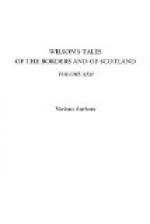“It is gone,” said I; “and I am gone also—to finish my bottle of Burgundy, which I have as little doubt was commissioned from finitude to strike a little fire into the heart of another erring mortal, not at this moment perfectly happy.”
And I made my way as quick as possible into the parlour, glad to get quit of the chill of the night air. Meanwhile, there appeared signs of some extraordinary movement in the other parts of the house, the nature of which Graeme probably ascertained as he came along the lobby, for I heard bustling and earnest conversation; and presently little Edith came stepping in beside me, with something very mysterious in her blue eyes, far too mysterious for being confided to loud words, and so a whisper told me that her mother was taken ill, and that Dr. Rogers had been sent for. This little bit of information carried more to my mind than it brought away from Edith’s. I knew before that Mrs. Graeme was on the eve of confinement, and it now appeared she had been taken in labour. I saw, too, that my visit had not been very well timed, and the worse that Graeme himself was in the extraordinary frame of mind in which I found him—unfit for facing the dangers, repaying the affections, performing the duties, and receiving the honours or enjoying the hopes of his situation. A rap at the door was the signal for Edith’s departure, with the words on her tongue that she knew the doctor’s knock. I was now, I thought, to be left to myself; nor was I displeased, for I wanted a lounge and a meditation; though of the latter I could not see that I could make much, if any, more than confirming myself against all preternaturals as agents on earth, however certain their existence may be beyond the mystic veil that divides the two worlds. I had known Graeme’s crime and Gourlay’s self-murder; but the crime was a trick among blacklegs, and the suicide was the madness of a gambler, who had risked his money and was ruined at the moment he wanted to ruin another. Surely Heaven had something else to do with its retributive lightnings than employ them, in subversion of all natural laws, in a cause so inferior in turpitude to others that every hour pass into oblivion, with more of a mark of natural, and less or none of supernatural chastisement. I thought I might be contented with such a view of these prodigies as might quickly consign them to the limbo of men’s machinations; yet somehow or other—perhaps the Burgundy bottle, if it could have spoken, like that of Asmodeus, might have helped the solution—I got dreamy, and of course foolish, raising objections against my own conclusions, and instituting an alter ego to argue against myself for Graeme’s theory. It has always seemed strange to me, that though mankind hate metaphysics, they are all natural metaphysicians, especially when a little wined. Perhaps the true reason may be, that as wine came from the gods, it is endued with the power of raising us to its source. At least, our aspirations, from being




